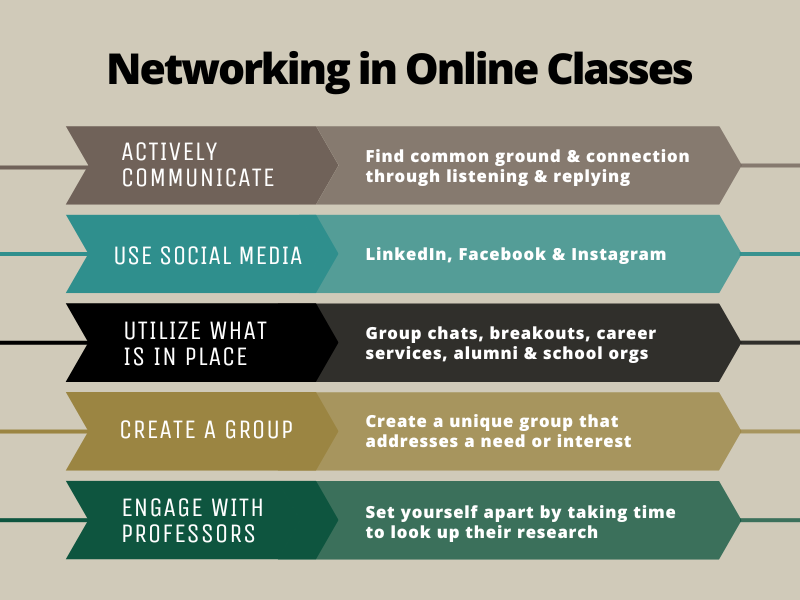
Networking can be an intimidating process for many college students, especially those taking classes online. Even so, networking is an important part of the job search process. It’s crucial to have a good handle on how to do it well, both in in-person settings and virtual ones.
What are the benefits of networking?
Networking takes advantage of perhaps the one thing that is truly common among any group of people in proximity: connections. This can be an encouraging perspective to anyone who is concerned about making a positive impression in a networking space. It’s not necessarily about portraying a certain image, you can also be an excellent networker by making natural, genuine connections.
There are many benefits of learning how to do this well, such as:
- Creating new opportunities for yourself, both personal and professional
- Taking better advantage of new information
- Opening yourself to new perspectives and ideas
Even when you’re faced with the prospect of your network being online or virtual, you can still make full use of those you are connected to by engaging with the communication channels that are available to you.
Networking in person vs online
When thinking of networking, you might picture a job fair or other gathering of professionals meeting as many people as possible. However, that’s not necessarily the case today. Technological improvements to internet connectivity and virtual meeting spaces have made virtual networking an important component to professional success. While making an in-person connection is always great, without the online follow up, many in-person connections would fall by the wayside.
There are many advantages to networking in person such as:
- Making a strong connection or first impression
- Communicating effectively and immediately
- Taking advantage of any spontaneous opportunity in person
However, there are also advantages to virtual or online networking like:
- Connecting across physical locations and time zones
- Building confidence before in-person networking events
- Maintaining new connections or renewing old connections
As a student working toward a bachelor’s degree or young professional finishing a master’s degree, the best place to start building your network is with your current classmates and professors. With social media sites like LinkedIn, you can connect with them easily and continue to communicate after your program is completed.
While in-person networking events are probably never going to disappear, virtual networking is here to stay. Building your virtual network now means you will also be able to take advantage of any physical events or other opportunities when they come up in the future.

How to network with classmates in online classes
Connecting with classmates virtually can be intimidating at first. Here are a few easy ways to make the online networking process as smooth as possible:
- Actively communicate
Active communication doesn’t always mean speaking up in class or being the first to initiate conversation in a virtual meeting room. Active communication can often have more to do with finding common ground, creating connection, and listening. All of which can be done in a virtual space. For instance, you might have a group chat or a discussion board where your professor or classmates post information. Take some time to write a reply to a classmate or professor, or send a “Happy Birthday” to someone if you know it’s their special day. These are small things that may not appear like much, but can lead to big connections later on.
- Use social media to its fullest advantage
Social media sites were initially created specifically to foster online connection. So it follows that if you’re looking to build your network, one of the best places to start is with social media sites like LinkedIn, Facebook, and even Instagram. Depending on where and who you are looking to network with, you may even find TikTok useful. Do your research on where your future connections are hanging out on social media and join those groups, chat rooms, threads, and message boards.
- Take advantage of what’s already in place
Most universities with online degree programs have a plan in place for helping their online students foster connection within a program. Professors will help you create group chats, breakout rooms, and connect you with classmates on group projects to build those bonds. But there are other opportunities to create a network outside of the virtual classroom. Get in touch with career services, reach out to program alumni, and join school organizations. Many of these can be done entirely online and will help you move from competing with your classmates to connecting with them.
- Create a group of your own
This option does take more initiative as it involves starting something new. However, it has the advantage of being customizable and controllable. If you’re looking to network with a certain group of individuals and that particular networking group doesn’t exist, try creating it. As you create something unique that addresses your specific need, you will likely be addressing that same need for others as well. This type of online community fosters genuine connections between community members who share your interests or goals.
Networking with classmates and faculty in a virtual setting is helpful in facilitating future success. Putting in the effort to build those connections now will serve you well later.
______
Who are you called to be?
Pursue your purpose at PLNU.
______
How to network with professors in online classes
Engaging with your professors is going to solidify your connection with them as a student. It also makes it more likely they will think of you when future opportunities come across their desks.
Start with these simple tips to build better connections with your professors in online classes:
- Communicate with them often
Professors go through a lot of time and effort to create lesson plans, interactive exercises, group activities, and lectures. By raising your virtual hand to clarify a point or expand on a topic, you show that you are actively listening to the material they spent time creating. When a professor feels like their material is valuable to you, they are more likely to connect with you on an individual basis.
- Follow and engage with their research
As a part of their job, most professors are required to continue research in a specific area. Some professors will use current students to help them with their research. By taking the time to look up a professor’s current or previous research and familiarize yourself with it, you set yourself apart from other students. A professor with a research internship opportunity is going to remember the student who took interest in their work beyond the classroom over other students.
Networking with faculty might seem difficult, especially if you have a large gap in age, education, or credentials. But remember that professors are interested in helping their students. You are important to them and they want to connect with you. You simply have to step into the virtual room with them and take a seat.
Check out PLNU’s Online Programs
Enrolling in an online program offers distinct advantages. You can study from anywhere, build a strong virtual network, and often continue to work while taking classes. With all of the virtual programs that universities like PLNU offer, there are many options for earning your online degree.